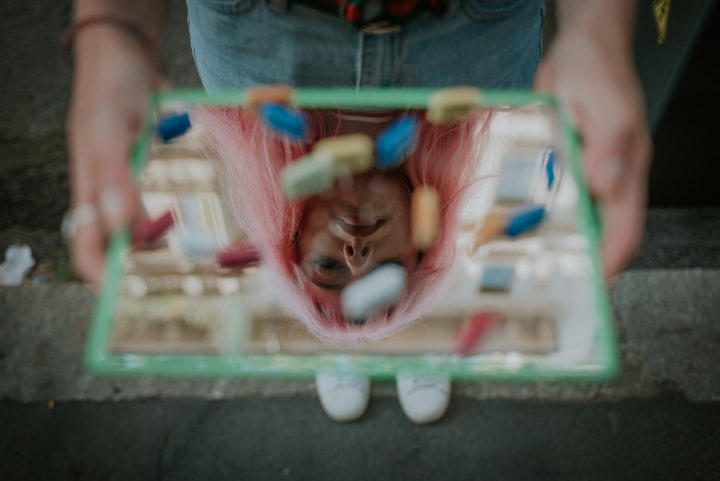Living with Depression
My Experiences with Mental Health, As Well As What I Believe When It Comes to Treatment, Education, and Recovery

It should be noted that the experiences I am writing about here are exclusively my own: they should not be considered a generalization of what is an incredibly complex and polarizing illness, and I want it known that I am not claiming in any way that what has helped me will help everyone. Recovery is an incredibly personal thing, and something that is done differently by every single person.
Over the last month or so, there's been a deluge of information on the internet—particularly social media—about mental health, especially in men and young people. It's been almost impossible to avoid, and it's been incessant to the point that I've found myself thinking about it a lot, and, at times, I've actually been inspired to get up and do something more than just write a Twitter thread about it (which, by now, I'm sure we can all agree does absolutely nothing).
Now, it may come as a surprise to people—though I'm not sure how big of a surprise—that for the last year or so I've lived with depression. I took a long time trying to work out how best to write this: "suffering from depression" is, I think, a profoundly negative term that implies I spend my entire life feeling sorry for myself. That isn't the case; it's not even remotely close. I think it would be more appropriate to say I live with depression. It doesn't dictate my life, and even though I have days where the idea of getting up and facing other people (or just the world) makes me want to vomit/curl up & die, I still survive.
That's not to say I don't struggle. Sometimes there are moments when the crushing weight of feeling absolutely nothing is unbearable, and I'm not even physically sure if I want to laugh or cry or just physically shut down. The darkest time for me was 2015, in the midst of exam season. I was unbelievably stressed (as was everyone), but one night, seemingly out of nowhere, it came to a head and mentally I collapsed. I was sat up in my bed at 2 in the morning, rocking back and forth with tears streaming down my face as I repeatedly called for my "mummy" and cried that I couldn't do it anymore. After my then 13-year-old brother heard me crying and fetched my mum, it took another hour with her holding me before I'd calmed down. It was a place I never want to return to, and although I have times where the stress begins to overwhelm me again, it's never gotten to that level.
Having said that, moments like the ones I've experienced are partly the reason that I'm so determined to ensure that we have adequate provisions in place that help everybody. It is also worth noting, however, that 75% of suicides are committed by men. The leading cause of death in young men is suicide. A shockingly low number of men feel safe opening up to others to talk about their mental health and "feelings." Why is this?The answer, I think, is pretty simple: masculinity and the fear of being seen as weak.
Since the dawn of time, emotions and feelings have been perceived as an exclusively feminine thing—something only women should be fully in touch with. There's the infamous adage that "men are from Mars; women are from Venus." Mars is, of course, the Roman god of war: the symbol for testosterone, aggression, violence, and might. Venus, on the other hand, is the Roman god of love: the symbol for sex, fertility, emotion, passion, and beauty. Because of stereotypes like these, men opening up and expressing emotion has been stigmatized, and the idea of male vulnerability has become a taboo. This is fueled by rhetoric by certain influential people in the media, who are so ingrained in their ideas of "masculinity" that they fail to consider how damaging and dangerous their ideas can be. It's profoundly disturbing that people like Piers Morgan are given a platform to berate men who are struggling with mental health problems, and I genuinely don't understand how he could ever justify labelling anyone with depression as "weak."
There is still, I believe, a huge lack of understanding when it comes to helping people who are struggling to cope with depression. As such, I thought I'd note down 5 things I've heard that, as filled with good intention as they were, were absolutely no help at all when I was having a bad day:
1. Why don't you just do something that makes you happy?
Firstly, if it was that simple would I not have done that already? On days when I'm struggling, I don't have any energy or motivation to even get out of bed, let alone go and do something else. When simply getting up in the morning becomes akin to an emotional and physical marathon, the last thing I want to do is anything else.
2. Your life is great, what are you depressed for?
Well obviously if we're going to compare my life to that of people who are infinitely less privileged than I am, then sure. But you're equating quality of life with how happy I should be, which makes very little sense when you think about how many celebrities also live with depression. Just because I come from a place of privilege doesn't mean depression suddenly doesn't exist for me, or for anyone else in my position.
3. Stop letting your life be ruled by negativity.
Whoa, thanks! I'm cured! I don't know why I didn't think of that before! This is literally the same as saying "why don't you just be happy?"—it does absolutely nothing. Would you ever tell someone to be more sad? Obviously not.
4. Avoid drugs. Or therapy.
This is the complete opposite of what people need to hear, a lot of the time. So many people suffer in silence because they're scared of talking to someone about how they really feel. Telling them to actively avoid talking to someone is only going to make them worse—especially when the people they could be talking to are specially trained in helping those who have depression. In addition, when properly prescribed and supervised antidepressants can be a very effective supplement to therapy. It all varies from person to person, and keeping an open mind when it comes to approaching new forms of therapy (whether through medication or not) is definitely the best option.
5. But you've always appeared so strong!
Just because I look like I'm coping doesn't mean I always am. Many people who live with depression tend to put on a "brave face," where they act as if there is absolutely nothing wrong—but deep down they may have emotionally shut down or be in an entirely different place.
Conversely, I always wanted to share things that people have done or said that helped me, in the hope that you might also be... inspired (God, I hate that word). It's also worth nothing, though, that this is only stuff that helped me: I'm not trying to say it would help everyone.
1. Be patient.
Sometimes, space to breathe away from everyone is what I need the most to recover, and it's comforting to know that I won't be pressured into going out or talking—especially if I really don't feel like it. If people are patient with me, it relieves a whole lot of additional unnecessary pressure.
2. Let me know if you need to talk.
Equally, knowing that I've always got someone who's willing to listen is a great comfort to me, and I'm really lucky in that I've been able to develop a strong and supportive circle of friends who genuinely care and want to help when they can.
3. You mean a lot to me.
This is one of the nicest things to hear from the people I care about—to know I am loved and cared for is one of the best feelings in the world. For me, it's like a warm hug that lasts for a long time, and it reminds me that I am loved—even if I don't believe so.
4. I want to help.
Sometimes when I'm struggling to cope, I feel as if I'm just inconveniencing everyone, and that they are annoyed by me if I reach out to them. However, actively being informed of their desire to help me is really helpful in alleviating a lot of self-doubt and empowering me to reach out and seek help without feeling in the way and, frankly, useless.
5. I'm not going to leave you.
When I'm really down, and I can't easily find a way out, I often feel that I've been abandoned: I get the sense that people don't want to listen, or that they aren't interested in helping, or that anything I do say isn't worth listening to at all. Just the reassurance, then, that my friends have no intention of abandoning me can have a really positive effect on my mood and general outlook.
I feel a little bit like society's view of depression and mental health is cyclical. It all starts when a celebrity either attempts, or actually commits, suicide: social media suddenly becomes inundated with people who insist they've always cared about mental health, and they start re-tweeting numbers for suicide hotlines or mental health charities. Then, after maybe a month, everyone goes back to their day-to-day lives of sweeping other people's problems under the carpet and avoiding the "awkward talk" that often comes with helping those who need help.
This is, I believe, because people don't really care. They only care when it conveniences them, when talking about mental health is the trendy and popular thing to do. But as soon as it becomes a problem that directly affects them, they'd rather have nothing to do with it. When Robin Williams killed himself, nearly everyone became passionate about preventing another tragedy, and the whole internet seemed alive with determination to de-stigmatize depression/mental health. But that's because it was easy—there was no real effort required in writing a Facebook post or tweeting or putting a picture of him on Instagram. Having a friend going through similar circumstances, though, is different: suddenly, people need to actually do something, and because they've never faced anything like that before, they shut down and just try not to get involved.
And that isn't necessarily their fault: dealing with depression as a friend or an ally is an incredibly scary thing. I have friends who live with depression and even I find myself struggling to know what to do when they're going through a dark time. What if the things that work for me don't work for them? What if I say the wrong thing? What if, God forbid, I only make them worse?
This is why we need significantly better educational provisions in place when it comes to mental health and depression. As we enter 2018 properly, I hope that, as individuals and as a developed society, we can strive for progress and a more understanding attitude to what I've talked about. Nobody should be made to feel weak because they've asked for help, and it's imperative that we move beyond archaic gender stereotypes that pitch men as being macho, masculine and void of all feelings. Ain't nobody got time for that.
If you've been affected by anything I've talked about in this article, or want more information, please follow the links below to a country-specific help page. (If you can't find your country here, follow this link to get a list of international numbers.)
Australia - lifeline.org
Canada - ementalhealth.ca
New Zealand - mentalhealth.org
Republic of Ireland - mentalhealthireland.ie
United Kingdom - rethink.org
United States - crisiscallcenter.org
About the Creator
Mopey Millennial
21-year-old British transplant, living in New York. Just another mopey millennial whose only emotional outlet is through a blog.






Comments
There are no comments for this story
Be the first to respond and start the conversation.